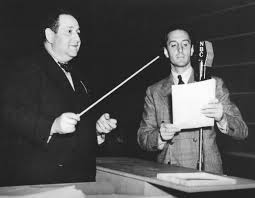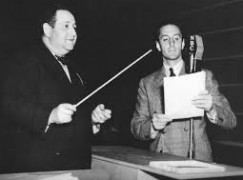The Slipped Disc daily comfort zone (269): More gold
mainLess well known than his violin concerto, Korngold’s short work for cello and orchestra has grown on me steadily down the years. It really sings, and this soloist does it proud.


Less well known than his violin concerto, Korngold’s short work for cello and orchestra has grown on me steadily down the years. It really sings, and this soloist does it proud.

A social media activist has circulated a video…

A PR informs us this morning that the…

The Berlin State Opera communicated tonight that its…

Zachary Woolfe, chief music critic of the New…

Session expired
Please log in again. The login page will open in a new tab. After logging in you can close it and return to this page.
Needs no defending.
Its only disappointing feature is its brevity, which makes it a challenge to place on orchestra programs — unless the cello soloist is also willing to perform another short work like the Saint-Saens 1.
But you know why it is so brief, don’t you?
Yes.
As it happens however the cello is unusually rich in repertoire with orchestra that is the perfect length to fill out the soloist’s share of a program and make them earn their fee (after all we wouldn’t want any Deception of the audience would we?), quite apart from the Saint-Saëns Concerto and a host of Baroque concertos. Saint-Saëns’s Allegro appasionato for one. The Respighi Variations, one of the real treasures of the repertoire. Bruch’s Kol Nidrei, or the Canzone. Bargiel’s Adagio, another gem. Dvořák’s Klid, known to us as Silent Woods. Tchaikovsky’s Variations of course, but also his Pezzo Capriccioso. Bloch’s Schelomo. Lars-Erik Larson wrote one of his Concertinos for cello of course (did he leave any instrument out of his list?). Glazunov’s Chant du ménestrel. A Romanza by Richard Strauss.
The list is quite long. And all of them are works that could stand an airing in concert now and then.
I was scheduled to perform Korngold at the end of January in Houston paired with Milhaud #1. (Orchestra size limitations from covid have forced us to Haydn D instead) The last time I performed it in Houston we paired it with Kol Nidre.
Absolutely stunning, pure Gold!
The movie it was written for is gloriously barmy!
A much better piece than the violin concerto, combining Russian steppe music with Viennese Schmaltz. A glimpse how Korngold could have developed if he had not been sucked into Hollywood.
Interesting to compare it with another Viennese late romantic composer who emigrated not to Hollywood but to England and became a much-honored musicologist:
https://www.youtube.com/watch?v=Kxw3vn5ISwc
A music without kitsch, born in a hostile 20C, but preserving the Viennese tradition.
John, getting “sucked into Hollywood” saved Korngold’s life, keeping him in the US while the Nazi scum ravaged Europe killing 6 million of Korngold’s fellow Jews, among a great many others. Without Hollywood Korngold would not have developed at all……………may I suggest a quick listen to the love music from Adventures of Robin Hood? You can put on some Boulez or Schoenberg afterward if you like…………..
There’s more than Holywood on one side and Schoenberg en Boulez on the other. Very much more, I would say. On reflection, so much more that my fingers almost got paralysed of the perspective.
I know why Korngold went to the US, like so many Jews. Also, many went to the UK. Not all of them who found a better life west of Europe were dependent upon Hollywood.
Extensive information about Jewish/musical émigré fates can be found on Michael Haas’ website:
https://forbiddenmusic.org/
Especially the 2 essays on ‘The music of inner return’ are to be recommended.
“I know why Korngold went to the US” – with respect, I don’t think Mr Borstlap does. The story is more complicated and more nuanced. He went to the US initially in 1934 to cooperate with Max Reinhardt on A Midsummer Night’s Dream, for which he re-orchestrated Mendelssohn’s music. Between 1934 and 1938 he was sometimes in Hollywood working on several original film scores, sometimes in Vienna continuing his career there. In 1938, before the Anschluss, he was in Vienna, but was summoned back to Hollywood to complete his contract for The Adventures of Robin Hood. So he and his family escaped (probably knowing what was about to happen).
It seems, then, that he freely chose, in the 30s, to work in the exciting and relatively new medium of film, and that he regarded the film score as a valid musical form with unique technical challenges, a form that he in fact more or less created.
There is a Korngold Society whose website points to a 1949 article on Korngold in the magazine ‘American Composers Today’: https://www.korngold-society.org/bio_page/Am_Comp_Today_1949.pdf
It is a fascinating read.
I also recommend https://bachtrack.com/article-korngold-hollywood-film-month
Mr Borstlap is, of course, still entitled to judge much of his output as kitsch and condemn as shallow those who appreciate and enjoy it!
Could it not be that in the thirties, composers still thought of the new medium of talkies that a new art form could be developed, like opera but with moving images? Quite some composers tried their hand at it. But commercial pressures steered the genre into another direction. And does Korngold’s earlier involvement with Hollywood mean that he did NOT escape the nazis? It seems to me that the two things nicely coincided.
Surely Mr Borstlap knows that this cello concerto started life in a 1946 Hollywood film?
The Hans Gal recommendation is very welcome.
Yes, and that happens – in this case – not to negatively affect the result of this piece. It’s better than film music and can stand on its own. Probably K has reworked the music a bit.
Of course, the fact that it was written as a cello concerto within the film makes it something other (better) than just film music. Was that Mr Bortslap’s point?
I did not know that, but retroactively that is indeed my point. The problem with film music is that if it conveys a mood, and nothing more, its function is fulfilled. And for a musical work that can stand on its own, that is merely the beginning.
What fun a conversation between Mr Borstlap and Mr Korngold about the function of film music, and how it relates to stand-alone music, would be. How sad it can never happen.
John, your Korngold posts seem to take on a rather greenish tint.
That’s because I had a pizza delivered by my PA but of which the origin is rather suspicious.
It’s nice but I still enjoy his violin concerto even more.
This was written for a melodrama called “Deception”, with Bette Davis, Claude Rains and Paul Henreid. The performance onscreen was actually played by Eleanor Aller, the mother of conductor Leonard Slatkin.
As regards Mr. Borstlap’s dismissiveness, I recall an anecdote about Reiner and Heifetz rehearsing the Tchaikowsky Violin Concerto together. Reiner said “This piece stinks.” to which Heifetz responded “Write one better.”
With Korngold, that is not too difficult. And it has already been done countless times: Stravinsky, Berg, Szymanowski, Shostakovich, Prokofief, Barber, Britten, Sibelius. Only Schoenberg’s violin concerto got even below Korngold’s level, in quite unexpected ways – using the notes Korngold had left out:
https://www.youtube.com/watch?v=_ukPsvh51hI
There are so many Korngold fans here, vigorously defending him! So I thought I would share the following news, just announced today:
The world’s No 1 orchestra, the Berlin Philharmonic Orchestra will perform Korngold’s Symphony in F# Opus 40 next year at the Salzburg Festival conducted by Kirill Petrenko, and will also tour the work across Europe. (Covid 19, permitting!)
https://www.salzburgerfestspiele.at/en/ … 2-petrenko
That should infuriate quite a few people. So – the revival of Korngold’s music continues apace, in the most distinguished places and by the greatest msicians of our time. They know he was a genius and are grateful for what he composed.